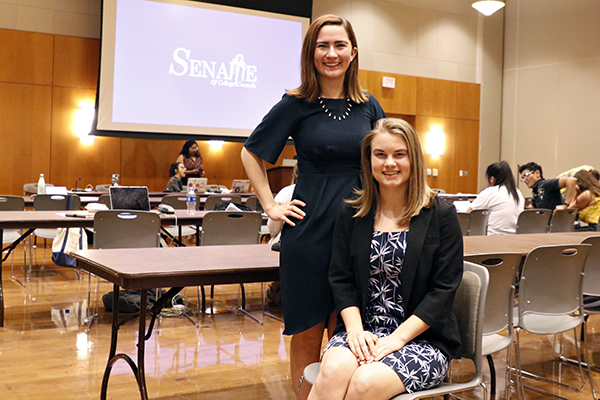In an effort to extend outreach this year, the UT Senate of College Councils leadership plans to hold town halls and use representatives to connect with organizations, among other initiatives.
Senate President Elena Ivanova said Senate leadership has 15 initiatives planned and is finalizing the agenda. She said the Senate also plans to continue the initiatives of previous Senate administrations, such as establishing a centralized testing center for students who need accommodations and waivers and delays of What I Owe fee payments.
“It’s very difficult to get big change to happen very quickly,” said Ivanova, a public health, government and Plan II senior. “You need a lot of continuous pressure because administrators encourage you to have big initiatives, and then they’re forgotten when your term is over and administrators continue other things with the next leadership.”
Ivanova said she had previously worked on creating a centralized testing center for students and is hoping to establish it this year.
“Students currently don’t have a centralized location for testing with accommodations,” Ivanova said. “The Student Services Building has a space, but it’s small, and we’ve dealt with administrators’ pushback.”
If implemented, Ivanova said waivers and delays of What I Owe fee payments would allow students to register even if they don’t pay on time. The initiative was created in partnership with the Counseling and Mental Health Center and UT Parking and Transportation Services, Ivanova said.
“If it’s too close to a student’s registration deadline and they still have that small fee on the What I Owe, they get dropped from their schedule and that negatively affects graduation rates,” Ivanova said. “We were trying to create a deferral policy where you can pay those fees a little later and still have a proper registration time.”
Ivanova said UT Senate’s new initiatives include creating virtual counseling by working with the CMHC, waiving family orientation fees for students with Pell Grants and working with libraries to provide more online access to textbooks.
Senate Vice President Katie Lee said there are also plans to improve the Senate internally, such as a liaison program in which external members serve as contacts with other organizations.
“A lot of it is relationship-building with the UT community in a way we haven’t done before,” said Lee, a Plan II and Arabic flagship junior. “It’s looking at the finer details of what we already do and refining the process to make things more efficient and making sure we’re tackling issues that have been affecting Senate for several years — outreach, communication, transparency.”
Internal director Sarah Hyden said part of outreach will include holding town halls open to students. She said these internal changes will help create external changes.
“Everything is flexible throughout the year,” urban studies senior Hayden said. “We set out an agenda to give us a direction, and then things get changed and adapted as we discover what students need.”
Ivanova said all legislative policies they choose to pursue will reflect the problems of the student population.
“I would not feel right if I didn’t use this platform to rectify problems,” Ivanova said. “It wouldn’t ber right. We could be helping students’ lives in minor ways and major ways.”





















